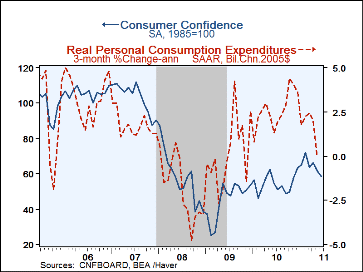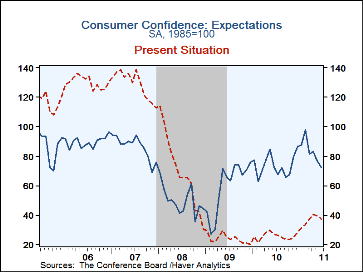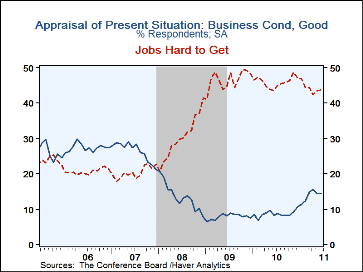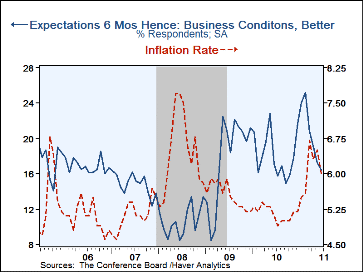 Global| Jun 28 2011
Global| Jun 28 2011U.S. Consumer Confidence, Future and Present, Continues Downward
by:Tom Moeller
|in:Economy in Brief
Summary
The Conference Board reported that its June Index of Consumer Confidence fell 5.2% to 58.6. That followed a 6.5% May decline which was slightly-less-than reported initially. The latest figure contrasted with Consensus expectations for [...]
The Conference Board reported that its June Index of Consumer Confidence fell 5.2% to 58.6. That followed a 6.5% May decline which was slightly-less-than reported initially. The latest figure contrasted with Consensus expectations for a reading of 61.0. During the last ten years there has been 45% correlation between the level of confidence and the three-month change in real personal consumption expenditures.
The expectations component of confidence fell a sharp 5.6% from May to the lowest level since October. Expectations for improved business conditions and employment in six months cratered to the lowest levels since early last year. Income expectations fell sharply as well. The turn in oil prices and the weak economy probably caused consumers to expect the inflation rate in twelve months to be 6.0%, the lowest since February. However, interest rates in twelve months were expected to be higher by 52.8% of respondents while just 14.9% expected rates to fall. A greatly lessened 26.4% of respondents expected stock prices to rise and an increased 38.0% expected decline. A very-much reduced 3.7% planned to buy a home within six months.
The present situations component of the consumer confidence index dropped 4.3% after a 2.2% May decline. Jobs were seen as hard to get by a slightly higher 43.8% of respondents, though that remained down from the November high of 48.8%. Business conditions were seen as good by a roughly stable 14.3% of respondents, double the February 2010 low, but 38.0% saw them as bad.
The Conference Board data can be found in Haver's CBDB database. The expectation figure is the AS1REPNA database.
How Do Households Respond To Uncertainty Shocks? from the Federal Reserve Bank of Kansas City can be found here.
| Conference Board (SA, 1985=100) | Jun | May | Apr | Y/Y % | 2010 | 2009 | 2008 |
|---|---|---|---|---|---|---|---|
| Consumer Confidence Index | 58.6 | 61.7 | 66.0 | 7.7 | 54.5 | 45.2 | 57.9 |
| Present Situation | 37.6 | 39.3 | 40.2 | 31.9 | 25.7 | 24.0 | 69.9 |
| Expectations | 72.4 | 76.7 | 83.2 | -0.4 | 73.7 | 59.3 | 50.0 |
Tom Moeller
AuthorMore in Author Profile »Prior to joining Haver Analytics in 2000, Mr. Moeller worked as the Economist at Chancellor Capital Management from 1985 to 1999. There, he developed comprehensive economic forecasts and interpreted economic data for equity and fixed income portfolio managers. Also at Chancellor, Mr. Moeller worked as an equity analyst and was responsible for researching and rating companies in the economically sensitive automobile and housing industries for investment in Chancellor’s equity portfolio. Prior to joining Chancellor, Mr. Moeller was an Economist at Citibank from 1979 to 1984. He also analyzed pricing behavior in the metals industry for the Council on Wage and Price Stability in Washington, D.C. In 1999, Mr. Moeller received the award for most accurate forecast from the Forecasters' Club of New York. From 1990 to 1992 he was President of the New York Association for Business Economists. Mr. Moeller earned an M.B.A. in Finance from Fordham University, where he graduated in 1987. He holds a Bachelor of Arts in Economics from George Washington University.
More Economy in Brief
 Global| Feb 05 2026
Global| Feb 05 2026Charts of the Week: Balanced Policy, Resilient Data and AI Narratives
by:Andrew Cates










